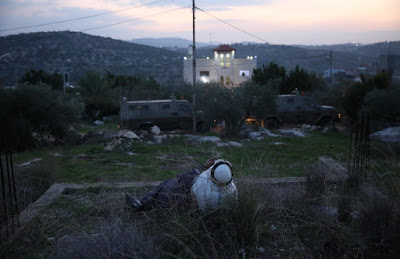Netanyahu gov’t steps up collective punishment tactics in the West Bank, pushes bill to expel families of accused attackers
 |
| Yumna Patel – December 17, 2018 |
Israel has stepped up its efforts to demolish the homes of Palestinians accused of carrying out attacks on Israelis in recent days, a policy that has been widely criticized for years as collective punishment.
Amid mounting pressure from his right-wing ultra-nationalist base, Israeli Prime Minister Benjamin Netanyahu has doubled down on so-called “deterrence” efforts, instructing security officials to fast track punitive home demolitions.
Over the weekend, the family homes of two accused Palestinian assailants were destroyed, leaving their relatives, who had nothing to do with the attacks, homeless.
On Saturday, Israeli forces conducted a massive raid on Ramallah’s al-Amari refugee camp, that lasted more than eight hours.
Local media reported that more than 700 Israeli soldiers besieged the camp in order to demolish the family home of Islam Abu Hmeid, who is accused of dropping a marble slab on the head of an Israeli soldier during a May raid on the camp, killing the soldier.
Despite the fact that Abu Hmeid has yet to be convicted by a court, the family’s four-story apartment building in the crowded camp was destroyed by Israeli forces using explosive devices.
In the predawn hours of Monday morning, Israeli forces raided the Tulkarem-area home of 23-year-old Ashraf Na’alwa, who was killed last week by Israeli special forces.
Na’alwa was accused of carrying out a shooting attack in October in the Barkan Industrial Zone in the West Bank, killing two Israelis.
Ma’an News Agency reported that as Israeli bulldozers demolished the three-story building, clashes erupted between Israeli armed forces and Palestinian youth in the area. At least six Palestinians sustained wounds, while three were arrested.
Later on Monday morning, Israeli forces delivered a demolition order to the family of 16-year-old Palestinian prisoner Khalil Jabbarin in the Hebron-area town of Yatta, in the southern West Bank.
Jabbarin was shot and arrested in September after he carried out a stabbing attack in the Hebron-area Gush Etzion settlement, killing one Israeli settler.
According to Ma’an, Jabbarin’s family was given two weeks to appeal the demolition order in Israeli court.
Locals have also reported that the family of 29-year-old Saleh Barghouthi, who was killed last week by Israeli special forces, also received a demolition order for their home in the Ramallah-area village of Kobar. Barghouthi is accused of carrying out a shooting attack last week that left several Israelis injured.
Earlier this month, Israeli forces delivered demolition notices to three other families of accused Palestinian assailants.
Israeli rights group B’Tselem has condemned the practice of punitive home demolitions as “court-sanctioned revenge” carried out on family members who have not committed crimes, amounting to collective punishment.
An Israeli military committee has even previously made recommendations to the government that the practice did not deter attacks.
Israeli soldiers take position as an excavator destroys the house of Palestinian man Ashraf Naalwa in the village of Shuwaykah, near the West Bank city of Tulkarem, on December 17, 2018. (Photo: Shadi Jarar’ah/ APA Images)
Israel doubles down on “deterrence” efforts
Israel’s Misterial Legislation Committee approved on Sunday a bill that would see the families of accused Palestinians attackers forcibly expelled from their homes and transferred to other areas of the West Bank.
The bill, proposed by Israel’s right-wing Education Minister Nafatali Bennett, stipulates that within a week of an attack or attempted attack, the Israeli army’s central command will be permitted to expel the relatives of the Palestinian assailants from their hometowns to other areas of the West Bank.
The committee approved the bill despite intense pushback from Israel’s attorney general, the head of the Shin Bet security service and the Israeli army chief of staff.
According to Haaretz, the director of the Shin Bet, Israel’s internal intelligence agency, opposed the bill saying that it would be nearly impossible to implement, and that it would “bring about a result that is the opposite of deterrence since its implementation would create tensions.”
Rights groups have argued that such legislation amounts to forcible transfer, a war crime under international law, as well as collective punishment, which also violates international conventions.
Tensions continue in West Bank
Tensions have been running high in the occupied West Bank since last week, when five Palestinians — including Barghouthi and Na’alwa — and two Israeli soldiers were killed in separate events in the territory.
Following the shooting attacks targeting Israeli settlers and soldiers in the West Bank-district of Ramallah, Israeli forces enforced widespread closures on Palestinian areas, and conducted massive search and arrest operations throughout the West Bank.
On Sunday, Israeli forces arrested three Palestinian minors from the Hebron-area al-Arroub refugee camp.
The increased presence of soldiers have also sparked clashes across the territory.
On Friday, Israeli forces shot and killed 16-year-old Mahmoud Nakhleh from the Ramallah-area Jalazone refugee camp.
Meanwhile, Israeli settlers continue to launch so-called “revenge attacks” on Palestinians across the West Bank.
Several incidents have been reported over the past few days in which Israeli settlers have hurled rocks at Palestinian vehicles, injuring drivers and passengers, and causing material damage to vehicles.



